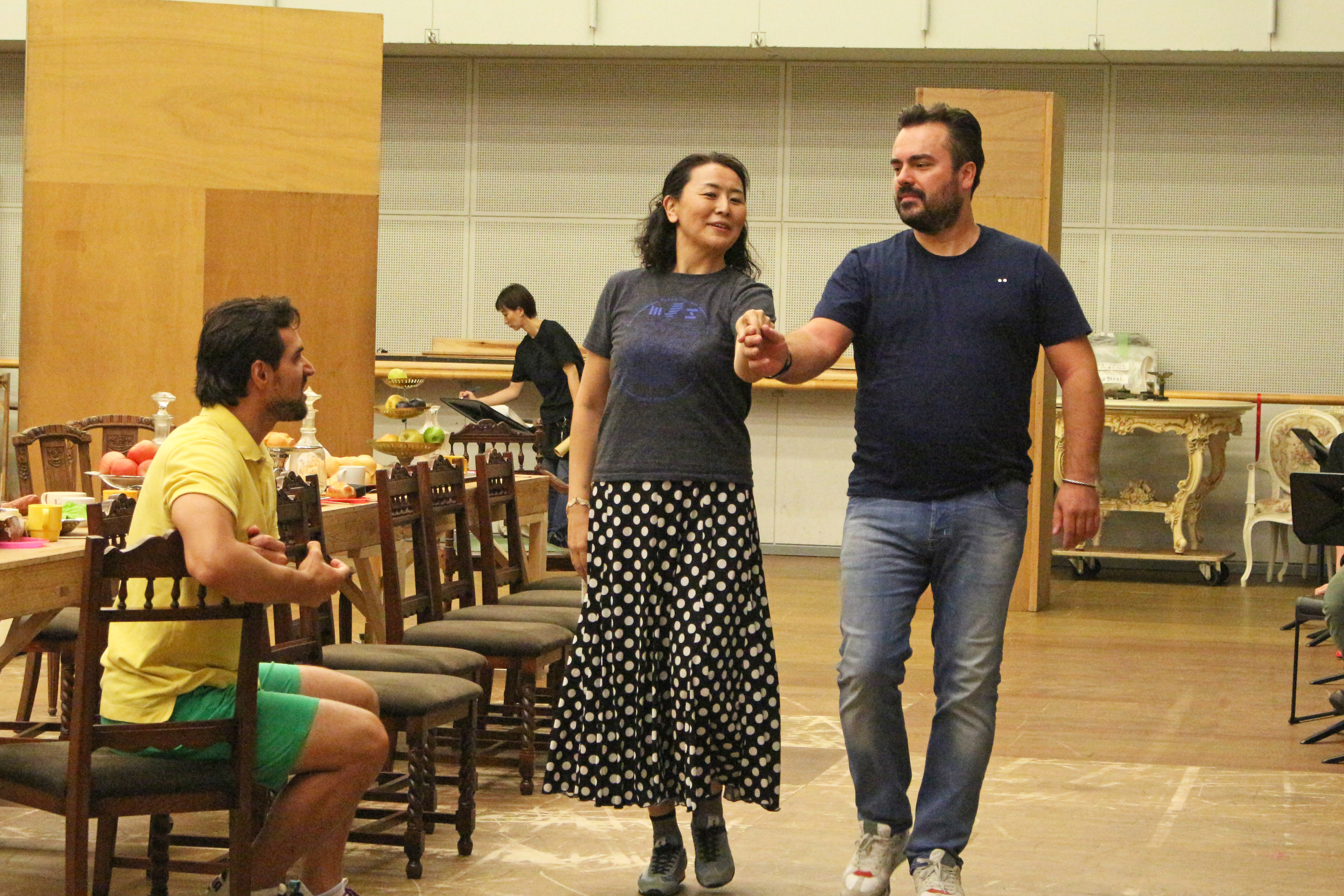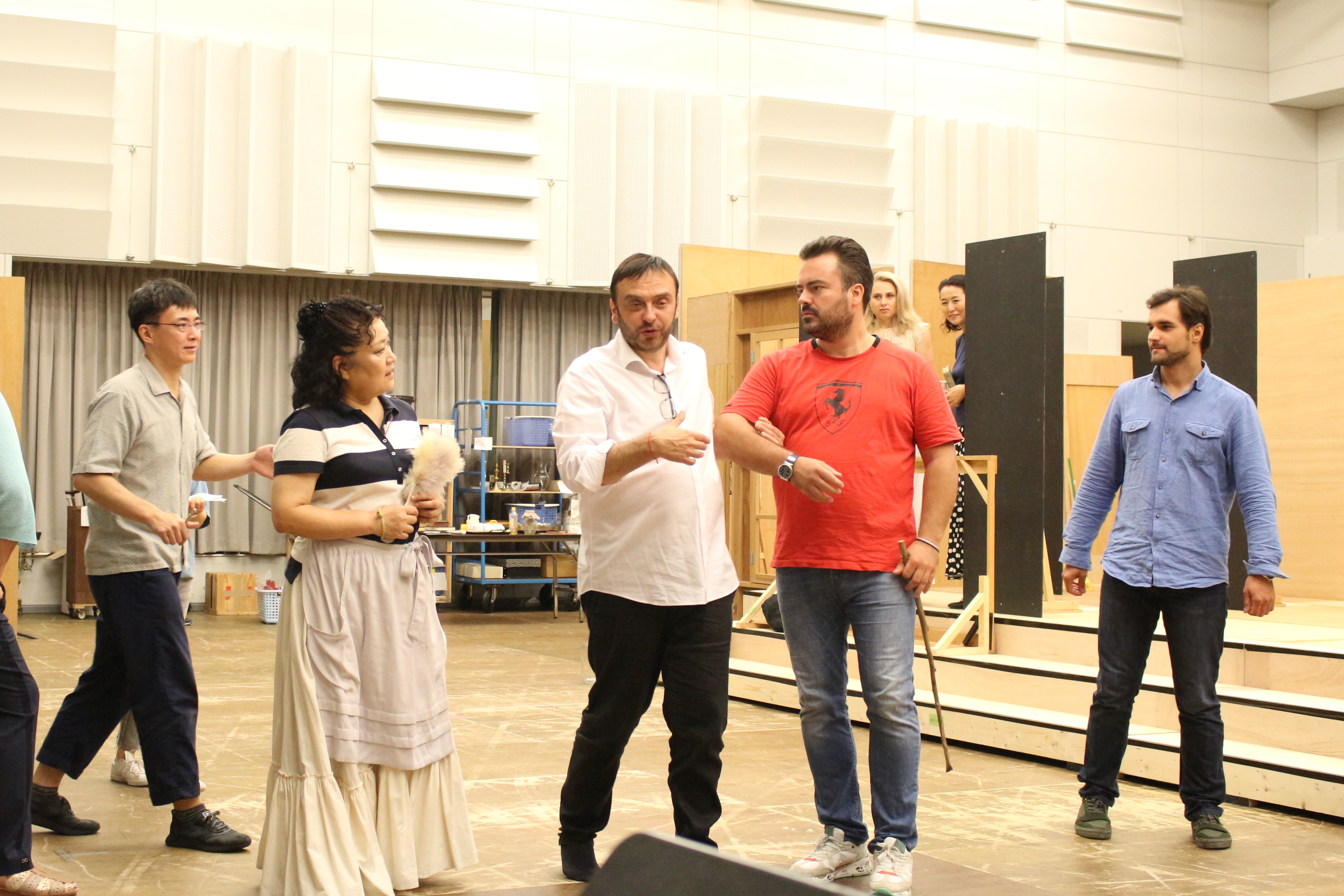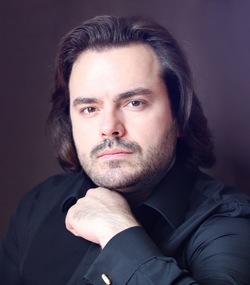Interview with Vasily LADYUK in the role of Onegin
---When did you start to think about becoming a professional singer? Are your parents musicians.?
L: My family love to sing and we all have pretty good voices, though we are related to music in different ways. My father is a colonel and a military conductor, my mother is a paramedic, and my brother is in the banking business. So actually, I am the only professional singer in the family. It all came about in a rather natural way.
Already as a little boy, I eagerly repeated the tunes coming from the radio or TV. My kindergarten teacher drew my parents' attention to this ability that she thought it had to be developed. So one day my parents decided to send me to a choir school. I was auditioned and enrolled. That was the famous Boys' Choir School in Moscow. It wasn't my choice, but music became my destiny. At school, I never thought about my future as a singer. We had to sing, and I sang. I even enjoyed singing. The Choir school was followed by the Choir academy.
Victor Popov, a famous choir conductor and head of both the school and the academy, traveled worldwide with his choirs. And so did I, because I belonged there. I sang solo part on several occasions, and we also went to Japan on concert tours. In 2005, I was a choir soloist during the Japan tour.
I was friends with my senior colleagues from the Academy who arranged and managed those tours, and it was my dream to become a music manager. Popov had other ideas about my career. He asked Dmitry Vdovin, a renowned voice teacher, to make, as he put it, a MAN of me. His word was the law. Vdovin tried to shape me as an opera singer. It took time and effort. Dmitry has become my lifelong friend and coach.
---In the profile, it says that you made your professional debut at the Novaya-Opera theatre in 2004. Why was it at the Novaya-Opera? Now you are a soloist of the Novaya-Opera theatre, will you tell us about the company, the Novaya-Opera.
L: The Novaya-Opera traditionally has a close bond with the Choir Academy that supplies high quality singers for the theatre. Both are music institutions and are interrelated. That is a case of mutual interest. But it goes automatically: there are always auditions for aspirants. All theatres need good staff. The Novaya-Opera is in a privileged position, so far as the Academy goes.
The Novaya-Opera ("new opera" in translation) was founded by a group of talented musicians who wanted to offer something new to the lovers of opera in our country. Yevgeny Kolobov was its driving force and a source of inspiration. His boundless enthusiasm and devotion to music attracted many of his colleagues - among others Dmitry Khvorostovsky. At the time, it was the most popular opera theatre in Moscow: new ideas, new productions, a different sound of the orchestra, a perfect choir and brilliant soloists - they worked magic.
The Novaya-Opera taught me a lot and gave a start to my career. It actually launched me into "the operatic orbit". I can now perform on the stage of other theatres worldwide, but so far, the Novaya-Opera remains my home theatre.
---You came to Japan with the Bolshoi Opera in 2009 and sang Prince Yeletsky (The Queen of Spades) and Onegin (Eugene Onegin). Do you remember those performances?
L: Sure I do. Of course, I remember those performances very well. For me it was something special, because I was privileged to be a stage partner of the great Elena Obraztsova. Claudio Abbado once said there was something "devilish" about her nature. She ignited us all by her sheer presence on stage. A living legend, vocally she was in a very good form, and her acting was mesmerizing. Not just the audiences, we were all under her spell. She motivated us to be at our best.
---So it was a quite impressive visit, right?
L: We were warmly received in Tokyo and enjoyed every moment of our stay there. As I said, I had toured Japan already as a choir soloist in 2005.But 2009 was the most fruitful year in my early career. I won in succession several major opera competitions: the Francisco Viñas Singing Contest in Barcelona, Placido Domingo's "Operalia", and to crown it all the International Opera Competition in Shizuoka.
So Japan has been in my heart since my early years.
---Are there any performances that turn out to be very important for your career?
L: Before my debut at the Bolshoi Theatre in 2006, I auditioned for Onegin in the new production of "Eugene Onegin" at the Bolshoi. Stage director Dmitry Chernyakov said I was not his "format". I didn't quite understand what he meant. Anyway, it was his production: he had the right to select singers for it.
So my debut at the Bolshoi Theatre was a year later in the part of Prince Yeletsky. It was also a new production of "The Queen of Spades". Mikhail Pletnev, the music director of the production, told me I was his choice, and I didn't need any auditions. It was the first time that I met Elena Obraztsova on the stage as a partner. It was a great experience. The premiere was a tremendous success, and the administration of the theatre even made a new poster with only Obraztsova and me on it. Critics wrote we were a perfect match.
Then there was a surprise call from Chernyakov who asked me to close the season in Opera Garnier in Paris, in the part of Onegin, to be followed by appearances in this production in Covent Garden and La Scala. I suddenly became Cherneakov's "format".
I don't think you will be surprised if I say that Onegin is one of my favourite roles. I will never forget my debut at the Novaya-Opera - naturally as Onegin.
Another great experience was the role of George Germont (La Traviata) in the production of the famous American stage director Francesca Zambello at the Bolshoi. It was a next step forward in my career. Later on, I took part in the jubilee performance of "La Traviata" in La Fenice, the theatre Verdi wrote his masterpiece for.

From the rehearsal of Eugene Onegin

From the rehearsal of Eugene Onegin
---For Russian people, what is the significance of "Eugene Onegin" by Alexander Pushkin? I heard that the students had to recite his poem in school.
L: Alexander Pushkin is the greatest poet of Russia. He had a great all-round impact on Russian culture and on the way of thinking. He is considered a founder and father of the modern Russian language. No wonder schoolchildren learn his poetic works by heart.
The famous Russian literary critic Belinsky described Pushkin's "Eugene Onegin" as "Encyclopedia of Russian life". It is also one of the best operas by Tchaikovsky. Melodism combined with psychological depth and drama made this opera one of the favourite in Russia and one of the frequently performed in the world.
---"Eugene Onegin" is no doubt one of the greatest Russian Operas by Tchaikovsky & Pushkin which means a great collaboration by 2 geniuses, please tell us your personal understanding of this opera.
L: Tchaikovsky was of a man with delicate sensibilities and he keenly felt the nature of the Russian spirit. If we call Pushkin the poet of the Russian soul, we can call Tchaikovsky the singer of the Russian soul. One can clearly hear it not only in Tchaikovsky's operas, but also in his romances and symphonies.
"Eugene Onegin" is a work of genius, and Tchaikovsky who was also a genius, managed to render Pushkin's masterpiece, in all its complexity, in a musical form.Both "The Queen of Spades" and "Eugene Onegin" rise in Tchaikovsky's musical philosophy to the level of tragedy, tragedy of the Russian soul.
---Onegin is quite unique for a main character in the opera. How would you like to portray Onegin? Does Onegin have any typical Russian nature in his personality?
L: Onegin has nothing against Lensky seeing him as his friend, though in reality, they are not. Onegin looks down on him. He is egocentric and doesn't love anyone. He flirts with Olga unemotionally, actually from boredom, and can't understand why Lensky makes so much fuss about it. He doesn't want to kill Lensky and offers conciliation.
Lensky, on the contrary, lives in the world of romantic love. He loves and cherishes his love. He will never betray his love and is prepared to die for it. Actually, I have a feeling that he wants to die to make Olga understand, what she has lost, and to suffer. He therefore will never agree to reconcile. Well, Onegin kills him and has no remorse, for it was Lensky's choice, or it was just Lensky's destiny.
Onegin is a typical representative of the noble young people in the 20-ies of the 19th century. Rich, well-educated and well-mannered he can't however find a proper place in life tormented by unrealized talents. Creating such a character, in which Belinsky saw "the premature aging of the soul", Pushkin reflected a main feature of the younger generation at the time. Hence Onegin's boredom. Onegin is a "suffering egoist" and yet an out of the ordinary figure.
---Pushkin himself lost his life in a duel. In this opera, the duel moves the drama, but the cause of the duel does not look serious to me. Was it something common or maybe etiquette in those days in Russia?
L: In Russia like in France in those days, honour and dignity were valued more than life. What may seem a silly trifle to us now, could lead to a duel and a tragic end.
---Onegin's attitude towards Tatyana changes completely from the first act to the third act. Why did he change so much?
L: While Lensky is a provincial lyrical character, Onegin is of tormented nature with a cold heart, in search of his self, his identity, his place in life.
Tatyana is a lovely girl, but she can't interest Onegin for she is an easy simple person, there's nothing to conquer, and the haughty Onegin arrogantly rebuffs her. He is in a search of strong emotions, and that is what he feels when he meets Tatyana in her married status. She is no longer just a lovely girl, nor is she easy game (as for a hunter - comm.) - that attracts Onegin. Is he really struck by love? Ability to love is not one of Onegin's strong points. Most likely, it is merely an amorous infatuation. He is always out for something unattainable. Suppose Tatyana yields, his feelings will shortly cool down, and what he took for love will be gone. And the question will arise - what next? His fate is in constant attempts to reach unattainable pinnacles. Lensky gave up. Onegin won't. Will that make him happy? Personally, I don't think it will.
---Russian Opera is associated as an opera of declamation, beautiful combination of the intonation of the words and melody. Does opera "Eugene Onegin" also feature the same?
L: Pushkin's verse in combination with the godly music by Tchaikovsky inspires performers in his operas, of which "Eugene Onegin" is undoubtedly a brilliant example. In my opinion, musical phrases in both arias and recitatives are just ideal for vocalization.
As is always with Tchaikovsky, in this opera the music clearly reflects the development of the dramatic line as well as the inner experiences and emotional longings of the characters.
---Maestro Andriy Yurkevych will be the conductor, and Mr.Dmitry Bertman from Helikon Opera will be a stage director for the production in the New National Theater Tokyo. Have ever worked with them?
L: With Andriy Yurkevych we did "La Bohéme" at the Norwegian National Opera in Oslo sometime in 2012. So far, we haven't crossed roads with Dmitry Bertman. It's about time we do.
Both Yurkevich and Bertman are high-class professionals, so I am sure this production is destined to success!


